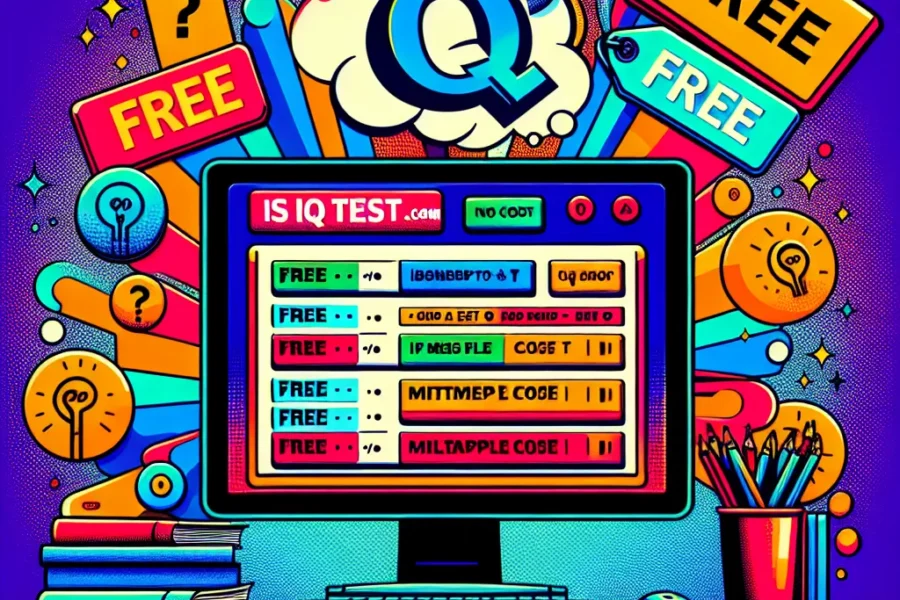Is Psychologytoday.com Free: A Critical Review of Its IQ Test
In the ever-evolving world of online mental health resources, PsychologyToday.com has secured a reputable spot. However, one particular feature of the website has drawn both interest and scrutiny—its online IQ test. While many seek such tests for a quick assessment of their intellectual capabilities, the worth and validity of these tests are essential points for consideration. In this article, we critically examine whether the IQ test on PsychologyToday.com’s website is truly free and delve into the concerns surrounding its efficacy and reliability.
If you are looking for legitimate IQ Tests which pass the entry bar for Mensa, see our IQ Tests.
**Understanding the Concept of IQ and the g-Factor**
Before we critically analyze the PsychologyToday.com IQ test, it’s crucial to understand the general concept of Intelligence Quotient (IQ) and its traditional measurement. IQ tests generally aim to measure a person’s mental capabilities in relation to others. One of the most crucial elements that serious IQ tests evaluate is the general intelligence factor, commonly known as the g-factor. The g-factor represents the cognitive abilities common to all intellectual tasks and is a significant component in legitimate IQ assessments.
**Does PsychologyToday.com Provide a Legitimate IQ Test?**
Simply put, the answer appears to be no. On diving into the particulars of the IQ test provided by PsychologyToday.com, several red flags emerge that call its legitimacy into question.
1. **Lack of an Easy-to-Find g-Factor Study**
The general intelligence factor (g-factor) is a pivot upon which credible IQ tests balance. The g-factor ensures that an IQ test examines various dimensions of intelligence in a weighted and structured manner. However, the IQ test on PsychologyToday.com fails to provide any accessible information or citations of a g-factor study. This lack of a disclosed study underpins the central flaw in the site’s IQ test—it’s hard to trust its results when foundational components aren’t transparently addressed.
2. **Absence of Norming Data**
Norming data in IQ tests is pivotal for calibrating scores against a large, demographically diverse population. Legitimate tests invest years into collecting and refining this data to ensure accuracy and reliability. Unfortunately, the PsychologyToday.com IQ test does not seem to exhibit any norming data. This omission calls into question the comparison basis of their IQ results and exacerbates the unreliability of the test.
3. **Negative Reviews Across Platforms**
Any thorough critical review must take into account user experiences and feedback. A quick browse through various review platforms unveils a slew of negative commentary about the PsychologyToday.com IQ test. Common complaints include:
– **Non-intuitive Interface:** Many users have reported that the test interface is not user-friendly, leading to confusion and incomplete assessments.
– **Hidden Costs:** Although the test may seem free initially, multiple users have claimed they were asked to pay to get their complete test results, which leads to frustration and distrust.
– **Unreliable Results:** Countless users have noted significant discrepancies between their results here and those obtained through professional, proctored IQ tests. These inconsistencies further underline the test’s questionable legitimacy.
**The Core Problem: Like Most Online IQ Tests, It’s Not on Par with In-Person Exams**
The convenience of online IQ tests is undeniable, but their accuracy often leaves much to be desired. Unlike in-person, proctored IQ exams administered by trained professionals, most online IQ tests—including the one on PsychologyToday.com—lack the rigid standardizations, comprehensive methodologies, and controlled environments necessary to yield accurate and reliable results.
**Evaluating the Psychological Meridian**
For evaluating legitimate intellectual capability, it’s crucial that the test takes into account a holistic view of mental faculties through a regulated, academically vetted process. Professional IQ tests conducted in person come equipped with numerous checks and balanced analyses to ensure they are capturing an individual’s true intellectual potential. These features include:
1. **Administered by Licensed Professionals:** Professional IQ tests are not just questionnaires on a screen. They involve carefully crafted questions and scenarios presented by professionals trained to gauge various aspects of human intelligence.
2. **Standardized Norms:** Established IQ tests, such as the Wechsler Adult Intelligence Scale (WAIS) and the Stanford-Binet, are calibrated against extensive norming data, making their scores reliable benchmarks for intellectual capability.
3. **Controlled Testing Environment:** One of the most significant drawbacks of online IQ tests is the lack of control over the testing environment. External distractions, varying internet speeds, and a non-standard test-taking atmosphere can all influence results, making them less reliable.
**The Deceptive Appeal of Free Online IQ Tests**
The allure of free online IQ tests is understandable—they promise quick and convenient access to a measure of one’s intelligence without the need for scheduling appointments or even leaving your home. However, this convenience usually comes at the cost of accuracy and genuine insight.
PsychologyToday.com’s IQ test epitomizes this trade-off. Its initial free offering is undoubtedly enticing, but users often find themselves navigating a monetized maze to access their full results. More importantly, the inaccuracies and unreliability that plague such tests render them little more than digital novelties.
**The Nuances of Intellectual Assessment**
An important perspective often missed when discussing IQ tests is that human intelligence is multi-faceted and cannot be adequately captured by scores alone. Quality IQ tests, especially those administered in-person, take into account a variety of dimensions including verbal comprehension, working memory, perceptual reasoning, and processing speed. The test on PsychologyToday.com, lacking transparency about its methodology and foundation, falls short in this regard.
A legitimate IQ test should provide a balanced analysis that reflects one’s mental capabilities through a multi-dimensional approach. Tests that do not disclose their methodologies, like the one on PsychologyToday.com, probably fail to provide this nuanced understanding, making their results not only unreliable but potentially misleading.
**Conclusion: Tread Carefully**
Navigating the plethora of online IQ tests can be a daunting task, filled with potential pitfalls and disappointments. Though PsychologyToday.com offers a range of mental health resources, its IQ test appears to be a less reliable feature when scrutinized critically. From the absence of a clear g-factor study and norming data to a slew of negative user reviews, the IQ test provided on the website raises many red flags.
For individuals seriously interested in assessing their intellectual capacities, professional, proctored IQ tests remain the gold standard. While the appeal of an easy, free online test is undeniable, the investment in a well-structured, in-person assessment is likely to yield far more accurate and insightful results. After all, the quest for understanding one’s intellectual capabilities is too important to leave to questionable online tools.
If you are looking for legitimate IQ Tests which pass the entry bar for Mensa, see our IQ Tests.
Navigating the landscape of IQ testing can be challenging, but it’s imperative to prioritize validity and accuracy over convenience. This ensures that the insights gained are both meaningful and reflective of one’s true potential.



Leave a Comment